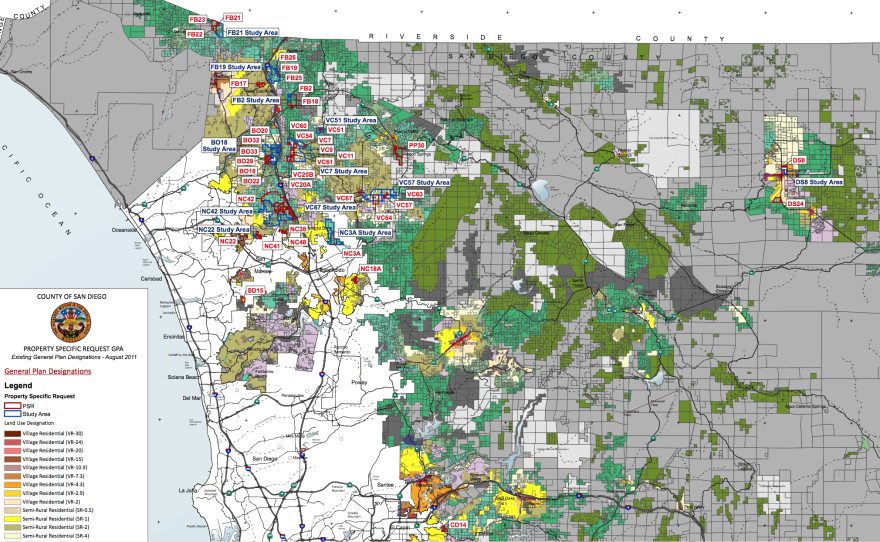San Diego County Supervisor Bill Horn is running for a sixth term. His lone challenger — Oceanside Mayor Jim Wood — is looking for votes from the enemies Horn has made during his long political career. But Horn has also made plenty of powerful friends.
“The underlying backbone of any kind of financial prosperity for us is the financial health of the county,” Horn said. “We need to maintain that."
Horn takes credit for San Diego County having a triple-A credit rating, unlike when he took office two decades ago and the county was on the verge of bankruptcy.
One problem for anyone running for supervisor is many voters have no idea what the county board does with its $5 billion budget. Wood, Oceanside's mayor since 2004 and Horn’s only challenger, said he’s asked that all the time.
“I tell them, hey, there’s the courts, the defense attorneys, the sheriff, county fire, senior services, youth services, the jails, you name it. It goes on — a long list of services the county is responsible for," Wood said. “I try to explain to them usually the biggest issue is land use.”
Development In Unincorporated Areas
Land use is a key issue for Wood because it is one where his position contrasts sharply with Horn’s. One example is the Gregory Canyon landfill, a proposal that has been in the works for two decades and that Wood strongly opposes.
Horn, along with many county voters, supported the plan for a new county landfill, but Wood, along with environmentalists, believes the risk of polluting the aquifer is too great.
Land use in the unincorporated areas of the county is a major concern for people like Michael Beck of the Endangered Habitats League and a county planning commissioner.
“This election means everything,“ Beck said. “It’s a dramatic difference between the two of them, so the stakes couldn’t be higher.”
Beck said Horn has earned enemies by seeking to undo the county’s General Plan, a planning document that defines where new housing developments can be built. Standing beside a large map of the county, Beck points to the areas where more housing projects are planned.

“The process that created the map in the first place was 12 years long, cost the public $18 million, hundreds of meetings,” Beck said. “Thousands of volunteer hours through the community planning groups and the citizens went into creating that map.”
But dozens of numbered squares on the map represent requests to change the General Plan and rezone undeveloped land for more houses. Almost all of those requested amendments are in Horn’s district.
Beck accuses Horn of blowing up a long-term, sustainable land-use strategy. Horn is unrepentant.
“Why would I want to overturn it?” Horn said. “Well, because I basically think it‘s wrong.“
Horn, who was a real estate broker, backs large private land owners, many of them farmers, whose land value depends on how many homes could be built per acre.
“I happen to be a farmer,” Horn said, “and you basically went in and robbed every farmer of their equity. If you’re in production agriculture, the value of your operation is the asset you own, which is the land.”
Wood said rather than getting his support from developers, he will listen to constituents who live in places such as Valley Center, where they’ve long fought to limit more housing developments, except in areas specifically defined in the General Plan.
5th District stretches all the way from the Imperial County line, though the unincorporated backcountry around Valley Center and contains four cities: Oceanside, Vista, San Marcos and Carlsbad.
Urban and Business Issues
When it comes to urban issues, Wood points to his fellow North County mayors who have chosen to invest in their own economic development plan, rather than sign on to Horn’s North County Economic Development Council.
“I go to all these meetings with all the North County mayors, especially the ones on the (state Route) 78 corridor," Wood said. "They’re all Republican. Not one of them is willing to join Bill’s POP — Prosperity on Purpose."
But are the mayors supporting Wood to replace Horn?
“Actually,” Vista Mayor Judy Ritter said, “I’m supporting Bill Horn at this point."
Ritter cites one good reason she and all the other mayors in Horn’s district (except Wood) endorse the incumbent.
“He’s built a lot of libraries, and he spreads his money around to all of the cities — you know he has a fund that he uses - and he helps non-profits, like he helped our Vista Village business association," Ritter said.
Horn, like all the county supervisors, has a fund of a million dollars a year that he hands out to local non-profits. The “neighborhood investment fund” has long come under attack as a way for supervisors to buy support.
But Horn defends the fund as a way to reinvest public money in the community. He has also built up support in the business community with his push to develop Palomar Airport into a hub for private jets, as well as a commuter link to Los Angeles.
Political consultant Chris Crotty believes that though Wood is a popular mayor in his home town, he will have a hard time winning votes across the whole district.
“In a district that size, it’s awfully difficult," Crotty said. "You’re talking about contacting about 80,000 voters — that’s hard to do, knocking door to door."
More than 300,000 registered voters are in the 5th District, but Crotty estimates turnout will be low in June.
Wood has raised less than a third of the almost $300,000 in campaign funds that Horn has collected. Wood is relying on Horn’s enemies to vote for him.
“People I go to in the 5th District, they all say the same thing. We’ll vote for you because you’re not Bill," Wood said.
But without the resources to get a clear alternative message out, voters are likely to be asking, “Who’s Jim?”
If one of the two candidates gets 50 percent of the vote plus one, he will win the seat outright in June. Otherwise, there will be a runoff in November. The office is nonpartisan, and both candidates are Republicans.








